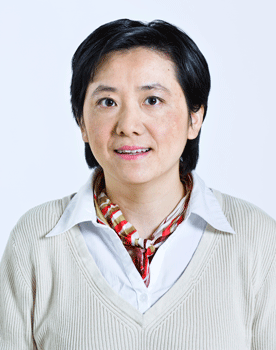
Research examines how blockchain technology improves financial market efficiencies for economic development
Dr. Fan Yang (PhD) is an Associate Professor of Finance and Management Science at the Edwards School of Business. With a focus on corporate finance and financial markets her research investigates emerging blockchain technologies for their potential to improve the efficiency of financial markets to not only reduce trade costs but increase engagement in international trade by less developed countries to assist in economic development. Dr. Yang’s work has been widely recognized and published in prestigious journals such as Review of Economics and Statistics, International Review of Financial Analysis, and International Journal of Managerial Finance.
Review of Economics and Statistics, International Review of Financial Analysis, and International Journal of Managerial Finance.
Q: What is the big question you are trying to answer?
A: My area of research is corporate finance and financial markets. Among many interesting questions in finance, the question my research is seeking to answer is: how can we improve the efficiency of financial markets in assisting economic development? Multiple tiers of research can help to achieve this goal, including diagnostic research to identify anomalies that hinder the efficiency of the financial market, prescriptive research that provides potential solutions to the identified anomaly, and empirical research, which testifies whether the solution is appropriate. For example, I am currently focusing on a research project that applies blockchain technology to help boost less developed countries’ engagement in international countertrade. This project can also be extended by applying blockchain technology to reduce trade costs in developed countries.
Q: What are your motivations for researching this topic?
A: Innovation happens unexpectedly. This might be the most exciting thing about my research in blockchain. Originally, blockchain (as in the Bitcoin Blockchain) was a gadget for tech geeks to play with, which enabled sending cryptocurrency in an efficient and decentralized way. Once it grew to a certain scale, it revealed some unexpected benefits and challenges to other areas of life, including that of economic development. For instance, we can use blockchain to build secure and transparent databases, and we can also use the technology to send money around the world at a lower cost than using banks. My research explores the possibility of using blockchain to manage goods in international trade. The application of blockchain technology can be used in the Canadian agri-food industry, to promote the export of agri-food products in international markets.
Q: What are some of the key outcomes of your research?
The blockchain program is more conceptual research focus than an empirical one. It explores the potential of introducing a new and still developing technology from the discipline of IT to economic development. So far, there is no empirical findings since this interdisciplinary research is still a blueprint. What we are focusing on now is the principles of using blockchain in managing physical assets, which is the key issue of international trade if we replace a centralized trade facilitator and bank with a decentralized blockchain.
Q: How would you describe the significance of this research?
A: Trade costs are estimated at about 74% of an ad-valorem tax equivalent (or tax based on the assessed value of an item) for developed economies.1 When trade costs are too high, the benefit of international trade will be suppressed by the costs and a country will give up global trade. We propose to use the blockchain technology to manage international trade such that the trade costs can be reduced significantly, given the advantage of blockchain in its distributed data structure, compatibility with smart contracts, and audibility by all participants. We presented our first paper, Blockchain Technology and International Countertrade, in the 2020 Cross Country Perspective in Finance Symposium, and is currently under review with the Journal of International Financial Markets, Institutions and Money.
Q: Do you have any research collaborations on this topic?
A: We have a group of researchers engaging in this research, with Dr. Craig Wilson at the Edwards School of Business and Dr. Hai Yu from Xian Jiaotong University. The Edwards Research Committee provided Seed funding to support pilot research on the application of the blockchain technology on the Canadian agri-food export.
Q: Were there any challenges you encountered with researching this emerging area?
A: The biggest challenge of this research is its interdisciplinary nature. Blockchain is a new technology that involves multiple contributors, such as algorithms and programming languages (computer science), trade (economics), financing (finance), smart contracts (law), and management of information, and logistics (operations). A broad-base cooperation across campuses and research disciplines will be the most efficiency way to conduct this type of research project.
Q: Has COVID-19 impacted or changed your research in any way?
A: Yes, COVID-19 adds some uncertainty to the research, particularly to the data collection where I interviewed farmers and practitioners in the agri-food industry in Canada. However, with the help of internet communication tools such as Zoom, I believe the impact will be minimized.
Q: What is the most significant contribution your work will make to this area of research?
A: This research is conceptual rather than theoretical or empirical research, in the sense that we are exploring an unknown area where there is no integrated theory on the technology, neither is there empirical observations for us to test. If there is anything about this research project that is interesting, it is its first-mover advantage: we are the first researchers exploring the potential of applying the Blockchain technology to the management of physical assets in the real world (relative to other existing research on applying blockchain to manage digital assets in the cyber world).
References
Anderson, James, E., and Eric van Wincoop. 2004. "Trade Costs." Journal of Economic Literature, 42 (3): 691-751. DOI: 10.1257/0022051042177649
Funding Acknowledgment: The Edwards Research Committee Seed Funding
To learn more about Fan Yang’s work, check out her profile page!
PUBLICATION HIGHLIGHTS
Chen, Jun, Gaoliang Tian, and F. Yang, 2020. Individual Investors’ Propensity to Speculate and A-share Premiums in China’s A- and H-shares, Emerging Market Review. 43 (June). https://doi.org/10.1016/j.ememar.2020.100689.
Yang, F. 2019. The Impact of Financial Development on Economic Growth in Middle Income Countries, Journal of International Financial Markets, Institutions and Money, 59 (March): 74-89. https://doi.org/10.1016/j.intfin.2018.11.008.
Wilson, C., and F. Yang. 2016. Shanxi Piaohao and Shanghai Qianzhuang: A comparison of the two main banking systems of 19th century China. Business History. 58(3): pp 433-452. https://doi.org/10.1080/00076791.2015.1122711.
